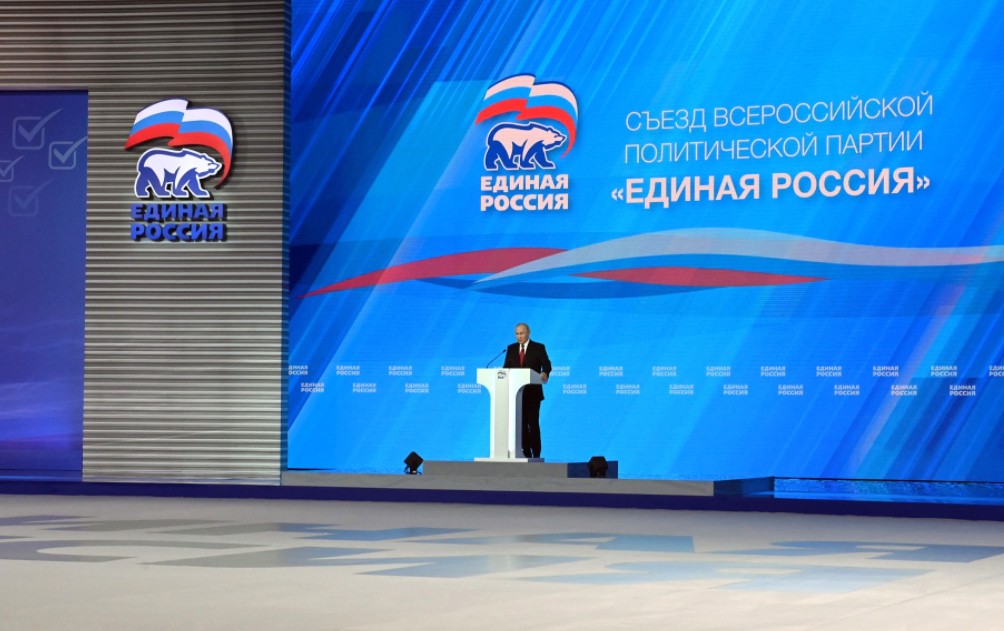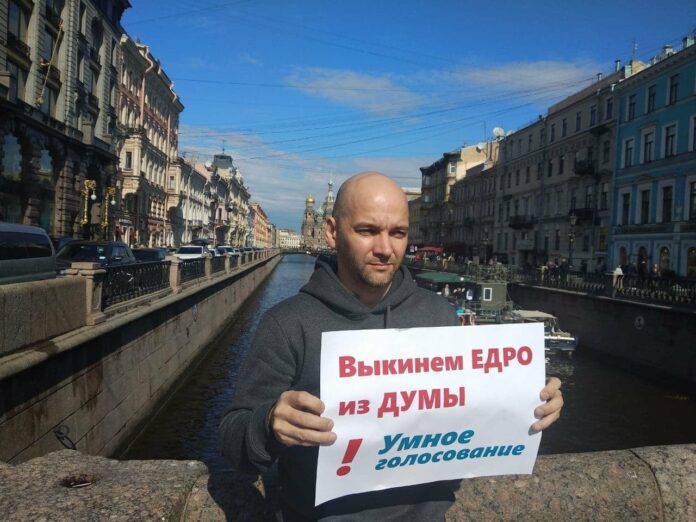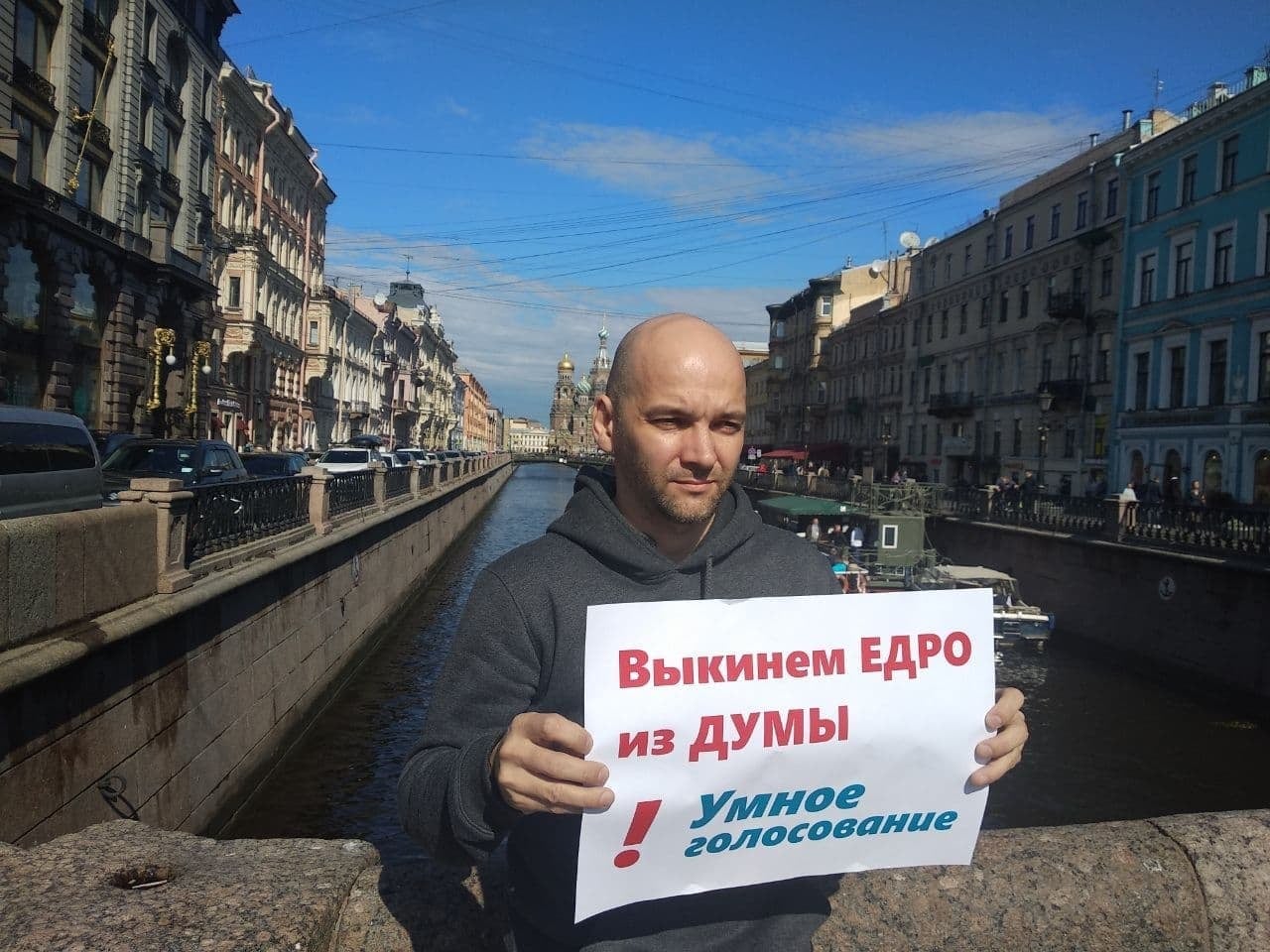Thirty years after the failed putsch against Mikhail Gorbachev, and the victory of universal suffrage and people’s sovereignty, Vladimir Putin has launched a new SpetsOperatsia against parliamentarism and the right to free and fair vote. For Operation Elections on September 17-19, 2021, he has chosen to free himself from all legal appearances and institutional constraints. He is imposing his rules of the game, and attacking all political actors, notably by jailing or driving militants, journalists and opponents into exile.
On September 20, the Central Election Commission will announce big victories, not fair electoral results. The 110 million registered voters will not be electing, but rather designating, the deputies of the State Duma, as well as the deputies of the legislative assemblies of the republics and regions, in a game of chance, since the capacity to manipulate the process, pressure the voters, and defraud the results is considerable. The very notion of popular representation in elected bodies is dead.
The important thing is to analyze this voting operation as a demonstration of the transgression and violence that leaders must exercise in order to stay in power. We must resist the temptation to comment on the “results” as an expression of political preferences, or a measure of the autocrat’s “popularity”.
The question is to understand why the Kremlin, apparently all-powerful, has to further degrade the vote and the legislative assemblies, which have been under control for years. Why can they no longer tolerate a few non-servile deputies out of the 450 in the State Duma? Why do they resort to high-profile corruption in the provinces with the sole aim of filling the provincial assemblies with servants?
The temptation to push the limits of a vote to the unanimous threshold is always present in a nondemocratic regime. Clearly manufactured majorities of 90% or even 99% are “crushing” in the literal sense of the word. They crush those who disagree, who want to have a choice, to sanction the rulers and to exercise a fundamental right enshrined in the constitution. They crush the opposition movements, which are banned from elections, and belittle the three “systemic” parties, which are endorsed by the Kremlin and have the promise of passing the 5% threshold: the Communist Party, the reactionary LDPR party, and the Just Russia party, which is close to United Russia. Yabloko, the “social-democratic” party of Grigory Yavlinsky, created in 1993, will once again try to pass the 5% mark, which it was denied in the previous legislative elections.
The goal that the Kremlin has set for the evening of September 19, 2021, is to obtain, as in September 2016, a very large majority of deputies who will approve the bills without debate. This means that they need to allocate at least two-thirds, if possible three-quarters, of the seats to the ruling party. The remaining small quarter will be made up of representatives of the other three “systemic” parties. In the past, the latter have sometimes refused to vote on a text, or abstained, but to no avail since they are consenting hostages.
The State Duma, the lower house, is elected half by proportional vote and half by single-mandate vote. The Kremlin had reintroduced this mixed mode in 2014 to counter abstentionism, which was so high in some constituencies that the validity of the exercise was questioned. Political scientist Grigory Golossov recalls that in September 2016, even after “adjusting” the results, United Russia was able to show only 54% of party list ballots. Thanks to a result of 90% in single-mandate vote, it had obtained 76% of the total vote.
Today, the problem has been reversed: candidates running on their own behalf, whether independent or supported by a “party”, are banking on their reputation to win a seat, as Putin and his system have lost a lot of popular support in recent years.

With some positive experiences in local and regional elections, Alexei Navalny’s movement launched Smart Vote in 2018. The method is simple: to encourage voters to go to the polls and vote for a candidate who does not represent power, whether he is a communist, LDPR or independent. The tactic is to ensure the victory of a few deputies who do not obey the Kremlin, in legislative assemblies and perhaps in the State Duma. This may seem tiny compared to the strength of the Putin system. However, the opponents are right to say that if Russians abandon the fight for universal suffrage, they lose one of the few instruments that allow them to expose the illegitimacy of the ruling groups. They are afraid of dissidents, journalists, and above all of the tens of millions of Russians who have had enough. The strategy is perilous. Several major figures have been killed -the former deputy Prime minister Boris Nemtsov in 2015-, others have escaped poisoning, such as Alexei Navalny and Vladimir Kura-Murza. There are several hundred political prisoners in the prison system.
In Russia, the electoral field is not a battleground for ideas or proposals, but the last public space where Russians can express their objection to current policies, and their demand for change, through a protest vote. Like the Belarusians, they demonstrate a remarkable posture, both combative and peaceful. Never has a democratic activist called for violence in response to police force, not in Russia, not in Belarus, not in Ukraine.
Russia’s leaders watched in awe as Alexander Lukashenko was routed in the Belarusian presidential election on August 9, 2020. According to independent estimates, the dictator got at most 15 to 20% of the vote. His main rival, Svetlana Tikhanovskaya, won at least 55-60% of the votes cast (turnout was high). Leonid Volkov and Vladimir Milov, members of the exiled Navalny team, point to one factor that has allowed the Belarusian dictator to maintain himself, using extreme violence: the absence of dissenting voices in the Belarusian parliament since the manipulated vote of November 2019. Unlike in Ukraine in 2004 and 2013, no elected official, no institution could accompany the mass protest, and ensure an orderly transition to a new regime.
Another element encourages opponents to promote voter resistance: the diversity of the regions and republics that make up the Russian Federation. The realities of each situation, across cities and provinces, pose some small challenges to central power. Of course, the “electoral sultanates”, as geographer Dmitry Oreshkin calls them, will present almost unanimous results in favor of the “party of power”, e.g. Chechnya and Tatarstan. Moscow and most of the big cities will give a much smaller percentage to United Russia, even after the usual fraud which, in every election since 2003, allows the percentage of the Putin vote to be “rounded up” to the nearest ten or more. In a few dozen smaller cities, where protest mobilization has been significant since 2018, the course of the vote is not perfectly predictable for the Kremlin. Indeed, presidents and secretaries of polling stations often show courage and honesty and do not apply rigging instructions. There are more than 96,000 polling stations in Russia, plus stations in Crimea, the Ukrainian Donbas, Abkhazia and Ossetia (de facto under Russian control since the 2008 war in Georgia). The organization of a ballot there is completely illegal, since Crimea and the city of Sevastopol were annexed in 2014, and the Ukrainian and Georgian provinces are unrecognized secessionist “republics”, where the Russian authorities have distributed millions of Russian passports. With a passport, one has the right to vote… for Putin!
It is important not to reverse the order of things. It is the crushing of universal suffrage and democratic representation that opens the way to unlimited repression and arbitrariness. Vladimir Putin does not need an overwhelming majority in the Duma to govern, and that is not why he has stepped up repression. He needs to hollow out public and social institutions. He wants to remain in power, in total impunity, without any control from citizens or institutions.
The head of state is also the head of the “sistema”, a system that has captured the res publica, the state and its resources. He must demonstrate that only he can impose and transgress. To do this, he must take the violation of civic rights and freedoms to a new level. Since 2020, the Kremlin has been following the path of Lukashenko: physical violence, heavy sentences, forced exile, and property grabbing.
The results produced by the very obedient central election commission will express the exasperation of an aging authoritarian regime, but will not reflect in any way the free choice of the Russians. I invite commentators not to headline on September 20: “Another Putin election victory! Overwhelming majority for United Russia deputies!” It would be distressing to spread disinformation and to suggest that the “Putin system” will indefinitely continue to repress, destroy institutions, monopolize money and resources, and keep the lid on an economy in crisis and a society in disarray… with the approval of the Russians!
These electoral SpetsOperatsii deserve our attention, because they offer a new opportunity to study the calculations and maneuvers that the authorities have to engage in, in order to sideline the voter without annihilating him. Indeed, the survival of the system depends on the survival of Vladimir Putin at the helm. And the leader of the system absolutely needs to stay President, if possible through a direct election, as in 2000, 2004, 2012 and 2018 (in 2008 he had a loyal servant, Dmitry Medvedev, elected to keep the seat during a four-year interlude). The next Operation Plebiscite is scheduled for the spring of 2024. However, the fate of comrade Lukashenko will probably be decided by then, with no small impact on comrade Putin.
Marie Mendras is a professor at Sciences Po and a researcher at CNRS. She specializes in Russia and Ukraine. She has taught at the London School of Economics and Hong Kong Baptist University and has been a visiting researcher at Georgetown University and the Kennan Institute in Washington. She is a member of the journal "Esprit" and its Russia-Europe Committee.
Marie Mendras has authored several publications, including Russian Politics: The Paradox of a Weak State (Hurst, 2012), Russian Elites Worry: The Unpredictability of Putinism (Transatlantic Academy, 2016), and articles such as "Navalny: La vie devant soi" in Esprit (Jan-Feb 2021) and "Le chantage à la guerre" in Esprit (June 2021).




